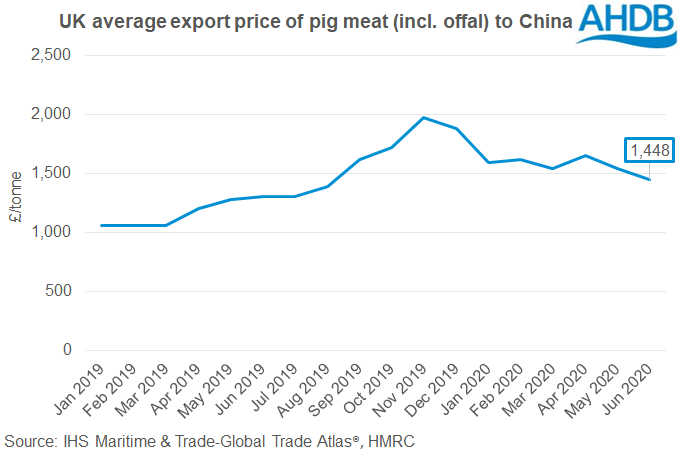UK pig meat exports pick up in June
Thursday, 20 August 2020
By Felicity Rusk
UK pig meat exports have moved back to recording year-on-year growth, following COVID-19 related disruptions hampering volumes in May. Meanwhile, UK imports of pig meat continued to track below the previous year in June, although the rate of decline was not as large as we have seen in recent months.
.png)
Exports
The UK exported a total of 21,100 tonnes of fresh/frozen pork in June, 15% more than in the same month in the previous year. The return to pork export growth suggests that much of the logistical disruption caused by the pandemic was largely resolved by June.
This means in the first half of 2020, UK pork exports totalled 124,300 tonnes, 6% more than in the first half of last year.
Exports to China remained at elevated levels in June, with shipments of pig meat (incl. offal) up 44% in volume terms on the year. Average export prices, meanwhile, dropped back by around £90/tonne on the month.

Within European markets, exports of fresh/frozen pork fell to some of the main export destinations. Exports to Germany and Ireland dropped back by 12% and 17% respectively, with volumes to the Netherlands (-8%) and Denmark (-14%) also falling.
Offal exports were in-line with last year. However, export destinations have changed somewhat, with an almost 90% increase in volumes sent to Belgium and over 50% less sent to Hong Kong and the Philippines.
Overall, pig meat exports in June totalled £51.1 million, 10% more than in the previous year. This brings the total value of exports in the first half of 2020 to £311.1 million, 15% more than in the first half of the previous year.
Imports
Meanwhile, UK imports of pig meat continued to track below the previous year in June, although the rate of decline was not as large as we have seen in recent months. This brings imports in the first half of 2020 to 404,200 tonnes, 13% less than in the previous year.
In June, import volumes of fresh/frozen pork fell by 10% on the year to total 29,400 tonnes. Fresh/ frozen pork imports from Belgium and the Netherlands alone were down by almost 4,000 tonnes compared to June last year. While imports from Germany did increase by 16% (1,200 tonnes), it was not enough to compensate for the declines from other source nations.
As has been the case in recent months, imports of processed pork were up on the year, recording an uplift of 14%. Shipments of sausages also were elevated on the year. In contrast, imports of bacon dropped back by 6% on the year.
While the average import price remains higher than last year, the decline in volumes means that the total value of imports in June only increased by 5%, to £197.3 million. This brings the total value of pig meat imports (incl. offal) for the first half of the year to £1.2 billion, just 0.6% less than the same period last year.
Sign up for regular updates
Subscribe to receive pork market news straight to your inbox. Simply complete our online form.
While AHDB seeks to ensure that the information contained on this webpage is accurate at the time of publication, no warranty is given in respect of the information and data provided. You are responsible for how you use the information. To the maximum extent permitted by law, AHDB accepts no liability for loss, damage or injury howsoever caused or suffered (including that caused by negligence) directly or indirectly in relation to the information or data provided in this publication.
All intellectual property rights in the information and data on this webpage belong to or are licensed by AHDB. You are authorised to use such information for your internal business purposes only and you must not provide this information to any other third parties, including further publication of the information, or for commercial gain in any way whatsoever without the prior written permission of AHDB for each third party disclosure, publication or commercial arrangement. For more information, please see our Terms of Use and Privacy Notice or contact the Director of Corporate Affairs at info@ahdb.org.uk © Agriculture and Horticulture Development Board. All rights reserved.

